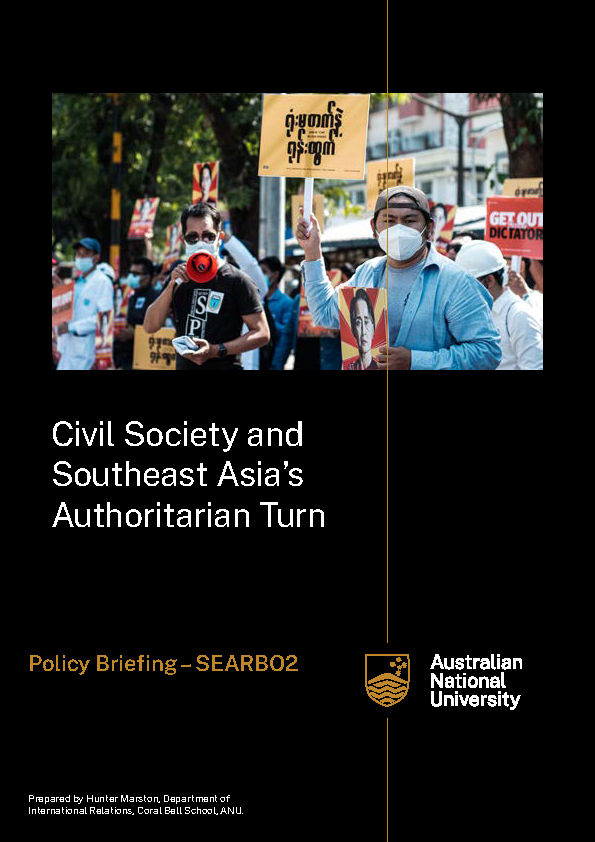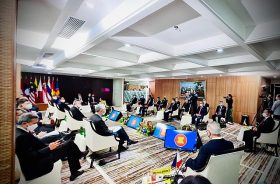[ad_1]
Despite decades of democracy promotion by international organisations and donors, illiberalism and autocracy still largely prevail across Southeast Asia. The return to military dictatorship in Myanmar, Rodrigo Duterte’s bloody drug war in the Philippines, identity politics in Indonesia and frequent military coups in Thailand present fresh challenges for international actors seeking to support civil society and promote human rights. Ethno-nationalism, religious persecution and the emerging appeal of “strongman” rule are sustaining illiberal headwinds across the region and reinforcing a shift toward authoritarian statism. In 2021, Freedom House ranked four Southeast Asian countries partly free (Indonesia, Malaysia, the Philippines, and Singapore) and six countries not free (Brunei, Cambodia, Laos, Myanmar, Thailand, and Vietnam). Only one country, Timor-Leste, was free.
The COVID-19 pandemic has exacerbated inequality and state repression across Southeast Asia. In Myanmar, the Philippines and Indonesia, which have comparatively poor health infrastructure, the pandemic has revealed limitations in state resources and governments’ ability to provide for the needs of their citizens. Some state leaders, such as Rodrigo Duterte in the Philippines, sought expanded emergency powers and rolled back democratic freedoms. The Philippines, Myanmar and Indonesia also failed to mount effective responses to the virus, which wreaked havoc on vulnerable populations and dramatically slowed economic growth. In Thailand, the Royal Thai Army has set up additional field hospitals to face a surge in cases, while the regime’s response to popular protests has triggered broad resistance from youth activists and civil society. Timor-Leste, which has the lowest GDP per capita in Southeast Asia, managed to contain the virus throughout 2020 despite weak public health infrastructure. However, preventing community transmission entirely proved impossible, and in February, the first cases of COVID-19 were detected near the border. Since then, 983 cases have been detected, and the nation reported its first COVID-19 related death on 6 April.
Click on the cover image below to download the full policy brief.

Despite the pandemic, elections went ahead in several Southeast Asian states including Singapore, Myanmar and Indonesia, while Malaysia held elections in eastern Sabah State. Rather than pave the way for a progressive younger generation in Southeast Asia to take the reins, electoral institutions have demonstrated the pervasiveness of illiberalism and durability of authoritarianism across the region. Despite decades of efforts by both the international community and Cambodian civil society, Hun Sen continues to rule Cambodia with near total impunity, jailing critics, banning opposition parties and reportedly orchestrating the murder of outspoken dissidents. In Myanmar, the military coup in February has brought the armed forces back to power and displaced the elected civilian government. The military has arrested opposition leaders and violently quashed protests, killing more than 750 civilians as of mid-April. All the while, it has continued to justify its actions with erroneous allegations of fraud in the November 2020 election.
Autocrats have wielded “authoritarian innovations” within democracies as well as autocracies to corrode institutions and norms and move their societies in increasingly illiberal directions by manipulating elections, controlling the internet, suppressing independent media and intimidating critics. Oftentimes, elected leaders insist such tactics will make their societies more, not less, democratic. In Indonesia, Malaysia, and the Philippines, electoral democracies have seen populists come to power by promising an end to corruption, stronger law enforcement, and conservative immigration policies. In the Philippines for instance, Duterte gained notoriety for his brutal crime eradication tactics as mayor of Davao. Since becoming president in 2016, his war on drugs has killed more than 8,000 civilians, and his administration has arrested prominent journalists and critics, including outspoken senators. Even Indonesia has become increasingly illiberal. President Joko Widodo has appealed to conservative Islamist groups and voters to safeguard his political power, while muzzling independent media and detaining prominent critics.
Related

Human rights ritualism in Southeast Asian regionalism
Regional organisations can play a wide range of roles in the human rights governance of the region, because different motivations for adopting rights and commitments result in different regional institutional designs.
Just as there is no simple correlation between democracy and good governance, we can no longer draw a straight line between authoritarianism and weak governance. Today certain undemocratic states boast good governance despite the absence of human rights. For instance, one-party authoritarian Vietnam proved among the most effective in the world at containing the pandemic and has shown greater transparency and more effective performance by local government, according to the UN-administered Provincial Administrative Performance Index (PAPI). Meanwhile, quasi-authoritarian Singapore is renowned for its cleanliness, quality infrastructure, and low levels of corruption. By comparison, democratic states such as Indonesia and the Philippines have had disastrous responses to the COVID-19 pandemic.
Authoritarian states such as Cambodia and Vietnam have found ways to co-opt civil society, approving and restricting activity areas which they deemed as more or less threatening to regime survival. In 2017 Cambodia expelled staff from the National Democratic Institute on erroneous charges of violating Cambodia’s “national sovereignty.” By contrast, international practitioners have been able to cooperate with municipal officials in Vietnam on less sensitive matters that nevertheless directly impact the lives of ordinary people. Even in outwardly democratic states like the Philippines, CSOs are vulnerable to state pressure. Philippine civil society increasingly finds itself operating at odds with an illiberal and coercive government, while critics of Rodrigo Duterte frequently become targets.
Therefore this paper proposes focusing on government accountability to bridge the growing divide between defective democracies and increasingly sophisticated authoritarianism. We can measure government accountability by examining a state’s ability to effectively deliver public goods and respond to citizen demands, be they basic health resources to contain the Covid-19 pandemic, physical infrastructure such as roads and water sanitation, or increased transparency from state officials. Focusing on government accountability has important implications for practitioners seeking to identify civil society partners that can improve subnational governance while advocating for democracy and human rights more broadly. Government accountability can also empower civil society organisations to demand greater transparency and public goods from illiberal states. Southeast Asia’ authoritarian turn and entrenched illiberalism require foreign donors to rethink the ways they engage local civil society in the face of new challenges.
[ad_2]
Source link